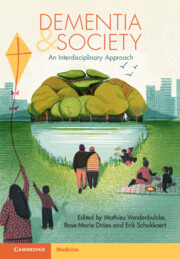Book contents
- Dementia and Society
- Dementia and Society
- Copyright page
- Contents
- Contributors
- Additional material
- Preface
- Chapter 1 Different Perspectives on Dementia
- Chapter 2 From History to Intervention
- Chapter 3 Personhood, Identity and Autonomy
- Chapter 4 Living Meaningfully with Dementia
- Chapter 5 Quality of Life of Persons with Dementia
- Chapter 6 Living with Dementia
- Chapter 7 Informal Care for Persons with Dementia
- Chapter 8 Risk Factors and Non-Pharmacological Prevention of Dementia
- Chapter 9 An Empowering Dementia Environment
- Chapter 10 The Impact of the COVID-19 Pandemic on the Well-Being of People Living with Dementia
- Chapter 11 Care Planning and the Lived Experience of Dementia
- Chapter 12 Societal and Ethical Views on End-of-Life Decisions in Dementia
- Chapter 13 Driving and Dementia
- Chapter 14 Social and Private Costs of Dementia
- Index
- References
Chapter 3 - Personhood, Identity and Autonomy
Published online by Cambridge University Press: 26 May 2022
- Dementia and Society
- Dementia and Society
- Copyright page
- Contents
- Contributors
- Additional material
- Preface
- Chapter 1 Different Perspectives on Dementia
- Chapter 2 From History to Intervention
- Chapter 3 Personhood, Identity and Autonomy
- Chapter 4 Living Meaningfully with Dementia
- Chapter 5 Quality of Life of Persons with Dementia
- Chapter 6 Living with Dementia
- Chapter 7 Informal Care for Persons with Dementia
- Chapter 8 Risk Factors and Non-Pharmacological Prevention of Dementia
- Chapter 9 An Empowering Dementia Environment
- Chapter 10 The Impact of the COVID-19 Pandemic on the Well-Being of People Living with Dementia
- Chapter 11 Care Planning and the Lived Experience of Dementia
- Chapter 12 Societal and Ethical Views on End-of-Life Decisions in Dementia
- Chapter 13 Driving and Dementia
- Chapter 14 Social and Private Costs of Dementia
- Index
- References
Summary
Words don't mean what we want them to mean. Concepts can be used in an improper way. In this chapter we examine how concepts such as 'self', 'identity', 'person', 'autonomy' and 'respect' are used in the context of discussions about what happens to a person with dementia. What emerges from this concept clarification is that we are more often tempted by unwarranted dualistic presuppositions than we realize; that the context in which a person can be an autonomous person presupposes intersubjective involvement; that when an individual can no longer participate in an intersubjective common understanding it has pernicious consequences for their autonomy, but that respect for the dignity of a human individual transcends this kind of participation. The exposition is complemented by an analysis of the legal handling of the concepts discussed.
Keywords
- Type
- Chapter
- Information
- Dementia and Society , pp. 45 - 62Publisher: Cambridge University PressPrint publication year: 2022

